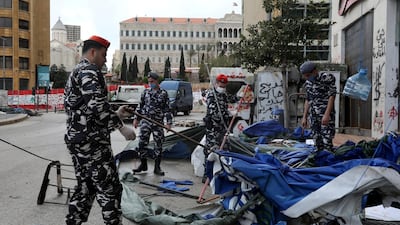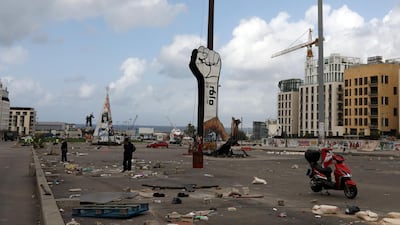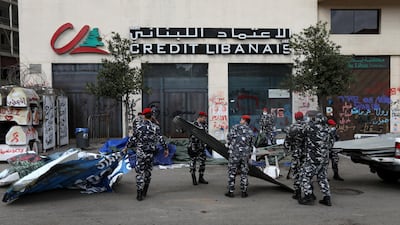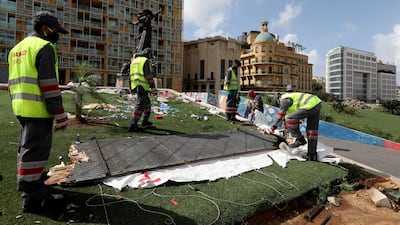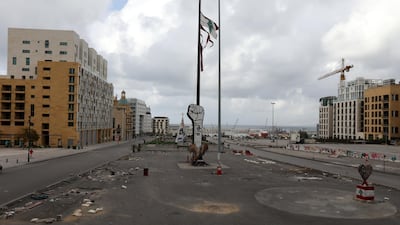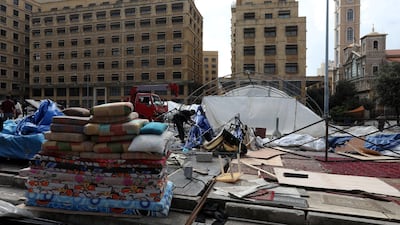Protesters have accused Lebanon’s government of using fears about Covid-19 to clear central Beirut of its remaining demonstrators, ending their five-month movement.
As the sun set on Friday evening, riot police dismantled the remaining tents in downtown Beirut, leaving a pile of brightly coloured tarpaulins on the ground.
Many protesters who had set up camp there for the past five months were forced to find emergency accommodation.
Interior Minister Mohamed Fehmi defended the move, tweeting on Saturday that it was “imperative, in the interest of the security of citizens and their families, to break up the sit-in camp in central Beirut".
The Cabinet had decided to impose a night curfew on Thursday and said it had “several complaints regarding the violation of these instructions".
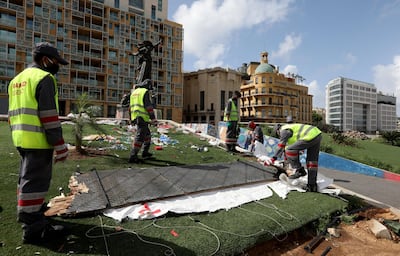
Mr Fehmi accused protesters of politicising the health measures.
“This sensitive stage is not appropriate to settle political scores,” he said.
The coronavirus has killed 11 people and infected 438 in Lebanon.
Protesters evicted from Martyrs' Square, a symbol of Lebanon's anti-government protests, and its surrounds on Friday told The National they had respected social distancing by not allowing more than 3 people to a tent.
They said they disinfected their tents and wore masks.
When the coronavirus crisis began, protesters decided that a minimum presence in Martyrs' Square and neighbouring Riad al Solh should be maintained to “keep the revolution going", said Khalil Deni, 33.
About 80 people stayed, Mr Deni said.
Protesters created their own quarantine space, with no coming and going allowed, he said.
They washed with water from a hose at the neighbouring Amine Mosque. Friends brought food and cleaning materials.
“I wore a mask, cleaned my tent and avoided groups,” protester Hady Ezzedin said.
Riot police on Friday evening gave them half an hour's warning before they started breaking down the tents, Mr Deni said.
Mr Ezzedin said: “They should have told us, 'You have one or two days to move your tent'.
"They attacked us suddenly. It was a terrible day.”
Mr Deni said he was held in a police van for four hours with three other protesters who tried to resist.
“The police kept us there while they finished their job,” he said.
Two of his companions were beaten, Mr Deni said, while the police forced Mr Ezzedin to erase videos he filmed on his mobile phone.
The Interior Ministry did not respond to a request for comment.
Natalia Sancha, a reporter for Spanish daily Al Pais, said that when she visited the protesters' camp site in central Beirut on Wednesday, many were sharing utensils.
“Some had masks but others shared glasses of coffee and forks when they ate together,” she said.
“A teenager who was sharing a cigarette with someone forbade me from taking pictures.”
Protesters denied that this had occurred.
“Even if this happened, this is the street and bad things always happen in the street,” said Mr Deni, who has returned to his hometown in the eastern region of the Bekaa.
"This has no relation with revolutionaries. The government should have stopped these people instead of destroying everybody’s tents."
Initially born out of Lebanon’s worst financial crisis since its independence nearly 80 years ago, the protests started losing steam after the first two months despite a massive turnout that forced the government to resign late October.
A new cabinet of specialists backed by traditional political parties was formed in January to steer the country out of the crisis.
As protesters wait for the coronavirus crisis to pass to return to the streets, they have organised food deliveries for the needy.
“The revolution will be stronger because all the Lebanese now have economic problems,” Mr Deni said.
The World Bank expects that the number of Lebanese living under the poverty line will jump from 30 to 50 per cent as the government struggles to find ways to cut spending.
Mr Ezzedin has returned to live with his family in South Lebanon, where his future is bleak.
Shortly before protests started, he quit his job at a supermarket when his boss asked him to work overtime for no extra pay.
His brother and sister are paid less than minimum wage for full time jobs, Mr Ezzedin said.
“I have a big hope that next time, [protests] will be very effective and change the system. Maybe in the summer,” he said.
